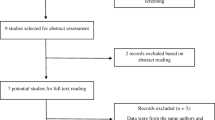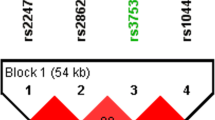Abstract
Alterations in lipoproteins are involved in the pathophysiology of Alzheimer’s disease (AD). For sporadic AD, the Apolipoprotein E (APOE) is recognized as a sole genetic risk factor. Apolipoprotein A1 (APOA1) has been suggested to bind amyloid β and promoter polymorphisms of the APOA1 gene were likely to affect the onset of the disease. Apolipoprotein D (APOD) expression is upregulating in AD brain and evidences showed APOD polymorphisms affect the risk for AD. The aim of this study was to investigate whether polymorphisms of both APOA1 and APOD genes are associated with early-onset AD (EOAD) and late-onset AD (LOAD). Common single nucleotide polymorphisms (SNPs) of the two genes were analyzed using a case–control study design. There were no associations between the two SNPs of the APOA1 gene and the onset of AD. No synergetic associations were found among the APOA1 SNPs, APOE and the risk for AD. Rs7659, 3′ UTR polymorphism of the APOD gene was associated with EOAD in APOEε4 (−) subgroup. We were unable to show any impact of the other two SNPs of the APOD gene on the risk for AD. Our results suggest that the variation of the APOD gene modifies the risk for AD. Further association studies for APOD 3′ UTR polymorphisms with other ethnic groups would be needed.
Similar content being viewed by others
References
Chen Y, Jia L, Wei C, Wang F, Lv H, Jia J (2008) Association between polymorphisms in the apolipoprotein D gene and sporadic Alzheimer’s disease. Brain Res 1233:196–202. doi:10.1016/j.brainres.2008.07.018
Desai PP, Hendrie HC, Evans RM, Murrell JR, DeKosky ST, Kamboh MI (2003) Genetic variation in apolipoprotein D affects the risk of Alzheimer disease in African-Americans. Am J Med Genet B Neuropsychiatr Genet 116B(1):98–101. doi:10.1002/ajmg.b.10798
Glockner F, Ohm TG (2003) Hippocampal apolipoprotein D level depends on Braak stage and APOE genotype. Neuroscience 122(1):103–110
Helbecque N, Codron V, Cottel D, Amouyel P (2008) An apolipoprotein A-I gene promoter polymorphism associated with cognitive decline, but not with Alzheimer’s disease. Dement Geriatr Cogn Disord 25(2):97–102. doi:10.1159/000112176
Helisalmi S, Hiltunen M, Vepsalainen S, Iivonen S, Corder EH, Lehtovirta M, Mannermaa A, Koivisto AM, Soininen H (2004) Genetic variation in apolipoprotein D and Alzheimer’s disease. J Neurol 251(8):951–957. doi:10.1007/s00415-004-0470-8
Koldamova RP, Lefterov IM, Lefterova MI, Lazo JS (2001) Apolipoprotein A-I directly interacts with amyloid precursor protein and inhibits A beta aggregation and toxicity. Biochemistry 40(12):3553–3560
Lefterov I, Fitz NF, Cronican AA, Fogg A, Lefterov P, Kodali R, Wetzel R, Koldamova R (2010) Apolipoprotein A-I deficiency increases cerebral amyloid angiopathy and cognitive deficits in APP/PS1DeltaE9 mice. J Biol Chem 285(47):36945–36957. doi:10.1074/jbc.M110.127738
Lewis TL, Cao D, Lu H, Mans RA, Su YR, Jungbauer L, Linton MF, Fazio S, LaDu MJ, Li L (2010) Overexpression of human apolipoprotein A-I preserves cognitive function and attenuates neuroinflammation and cerebral amyloid angiopathy in a mouse model of Alzheimer disease. J Biol Chem 285(47):36958–36968. doi:10.1074/jbc.M110.127829
Martinez E, Navarro A, Ordonez C, Del Valle E, Tolivia J (2012) Amyloid-beta25-35 induces apolipoprotein D Synthesis and growth arrest in HT22 hippocampal cells. J Alzheimers Dis 30(2):233–244. doi:10.3233/JAD-2012-112102
Merched A, Xia Y, Visvikis S, Serot JM, Siest G (2000) Decreased high-density lipoprotein cholesterol and serum apolipoprotein AI concentrations are highly correlated with the severity of Alzheimer’s disease. Neurobiol Aging 21(1):27–30
Muffat J, Walker DW, Benzer S (2008) Human APOD, an apolipoprotein up-regulated in neurodegenerative diseases, extends lifespan and increases stress resistance in Drosophila. Proc Natl Acad Sci USA 105(19):7088–7093. doi:10.1073/pnas.0800896105
Navarro A, Del Valle E, Astudillo A, Gonzalez del Rey C, Tolivia J (2003) Immunohistochemical study of distribution of apolipoproteins E and D in human cerebral beta amyloid deposits. Exp Neurol 184(2):697–704. doi:10.1016/S0014-4886(03)00315-7
Ordonez C, Navarro A, Perez C, Martinez E, del Valle E, Tolivia J (2012) Gender differences in apolipoprotein D expression during aging and in Alzheimer disease. Neurobiol Aging 33(2):433 e411–e420. doi:10.1016/j.neurobiolaging.2011.01.010
Paula-Lima AC, Tricerri MA, Brito-Moreira J, Bomfim TR, Oliveira FF, Magdesian MH, Grinberg LT, Panizzutti R, Ferreira ST (2009) Human apolipoprotein A-I binds amyloid-beta and prevents Abeta-induced neurotoxicity. Int J Biochem Cell Biol 41(6):1361–1370. doi:10.1016/j.biocel.2008.12.003
Smach MA, Edziri H, Charfeddine B, Ben Othman L, Lammouchi T, Ltaief A, Nafati S, Dridi H, Bennamou S, Limem K (2011) Polymorphism in APOA1 Influences high-density lipoprotein cholesterol levels but is not a major risk factor of Alzheimer’s disease. Dement Geriatr Cogn Dis Extra 1(1):249–257. doi:10.1159/000329910
Song F, Poljak A, Crawford J, Kochan NA, Wen W, Cameron B, Lux O, Brodaty H, Mather K, Smythe GA, Sachdev PS (2012) Plasma apolipoprotein levels are associated with cognitive status and decline in a community cohort of older individuals. PLoS ONE 7(6):e34078. doi:10.1371/journal.pone.0034078
Thomas EA, Laws SM, Sutcliffe JG, Harper C, Dean B, McClean C, Masters C, Lautenschlager N, Gandy SE, Martins RN (2003) Apolipoprotein D levels are elevated in prefrontal cortex of subjects with Alzheimer’s disease: no relation to apolipoprotein E expression or genotype. Biol Psychiatry 54(2):136–141
Vollbach H, Heun R, Morris CM, Edwardson JA, McKeith IG, Jessen F, Schulz A, Maier W, Kolsch H (2005) APOA1 polymorphism influences risk for early-onset nonfamiliar AD. Ann Neurol 58(3):436–441. doi:10.1002/ana.20593
Wenham PR, Price WH, Blandell G (1991) Apolipoprotein E genotyping by one-stage PCR. Lancet 337(8750):1158–1159
Acknowledgments
This study was partially supported by the High Technology Research Center Grant from the Ministry of Education, Culture, Sports, Science and Technology of Japan and Sportology Center, Juntendo University Graduate School of Medicine. We are grateful for the technical assistance of Ms. K. Yamamoto. We have no potential conflicts.
Author information
Authors and Affiliations
Corresponding author
Rights and permissions
About this article
Cite this article
Shibata, N., Nagata, T., Shinagawa, S. et al. Genetic association between APOA1 and APOD polymorphisms and Alzheimer’s disease in a Japanese population. J Neural Transm 120, 1599–1603 (2013). https://doi.org/10.1007/s00702-013-1036-7
Received:
Accepted:
Published:
Issue Date:
DOI: https://doi.org/10.1007/s00702-013-1036-7




